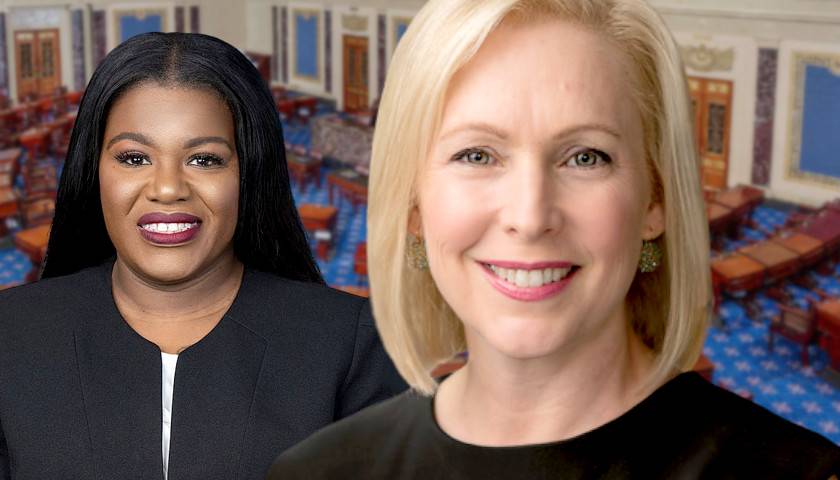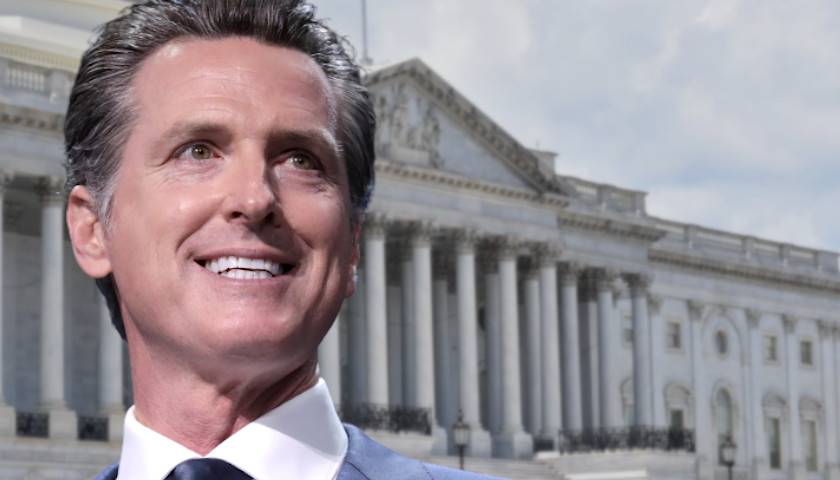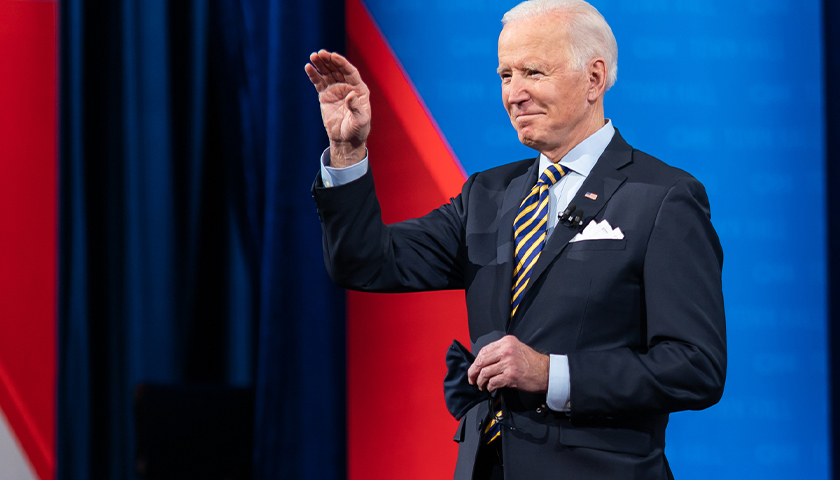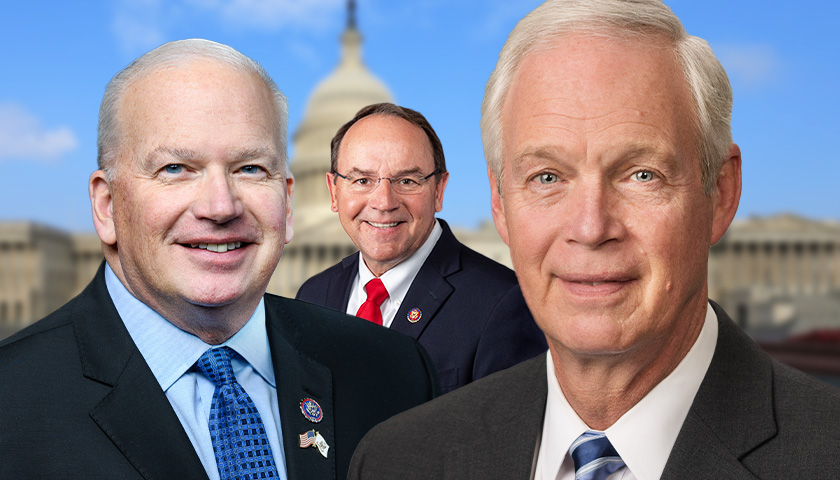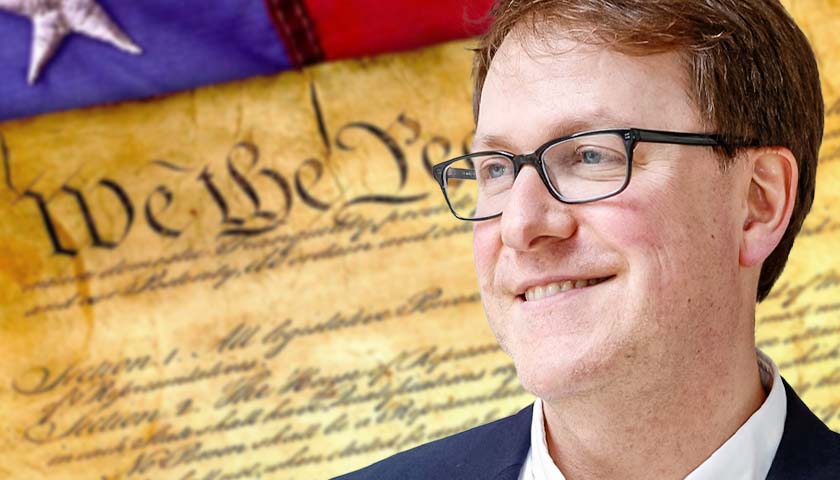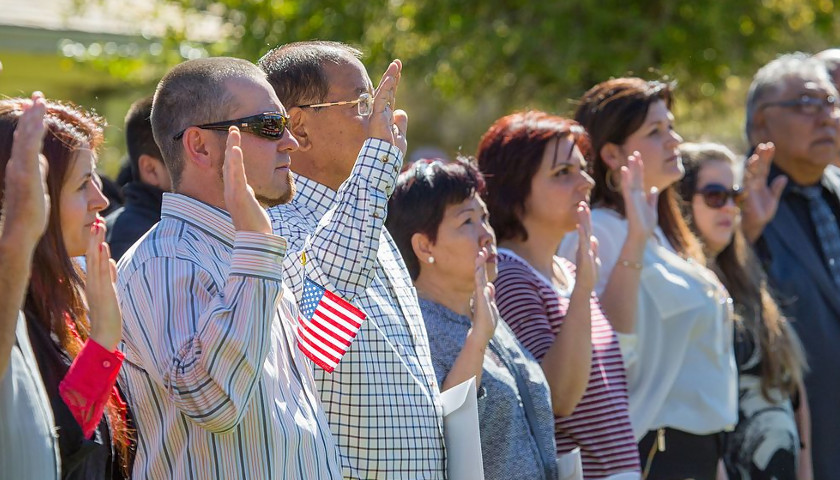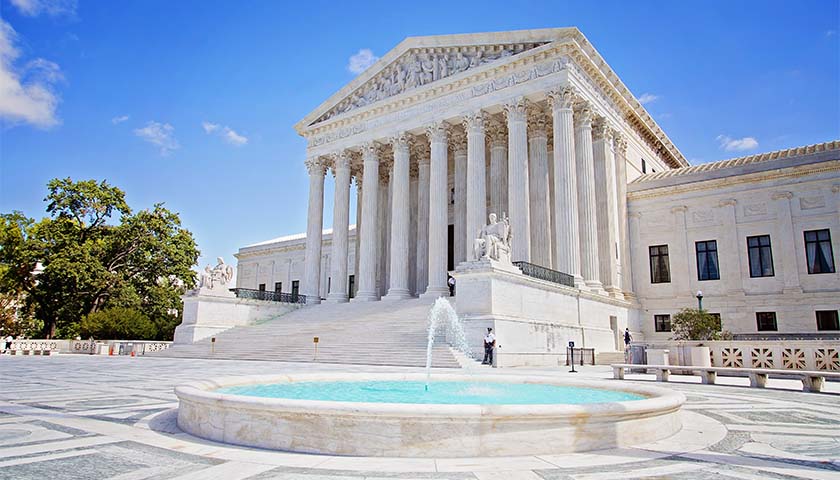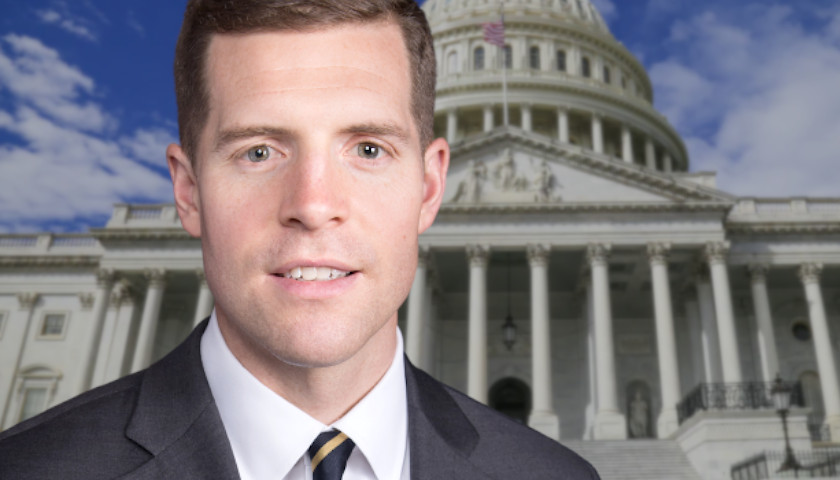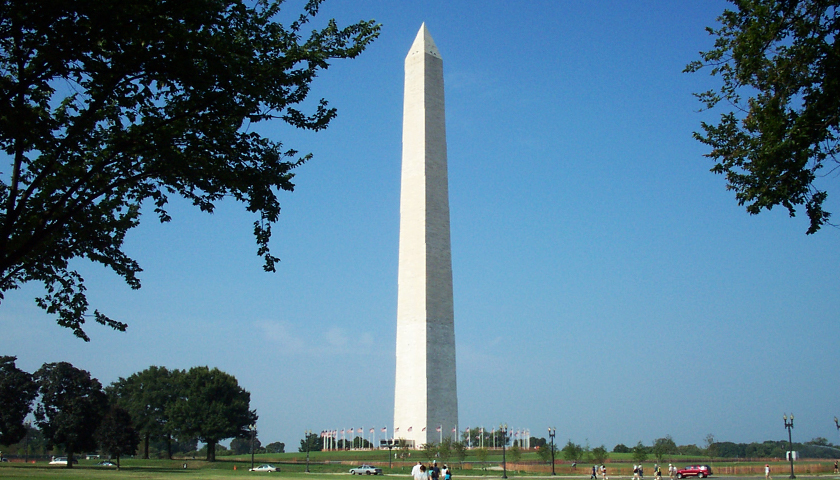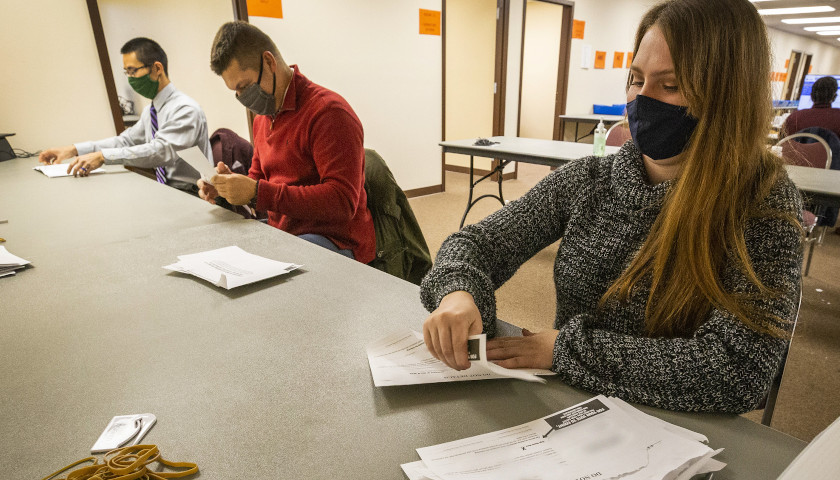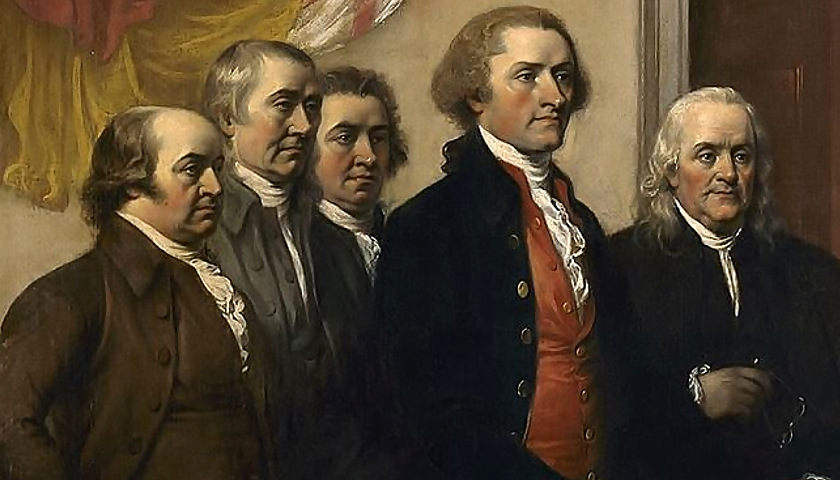As we celebrate our independence on the Fourth of July, Americans would do well to reflect upon what’s necessary for a nation conceived in liberty, and dedicated to the proposition that all men are created equal, to long endure.
Read MoreTag: U.S. Constitution
Supreme Court Rules Banning Homeless Encampments in Public Places Doesn’t Violate U.S. Constitution
The Supreme Court on Friday ruled 6-3 that banning homeless camps in public spaces isn’t a violation of the constitution.
Read MoreCommentary: The WHO Pandemic Treaty Is Deja Vu All over Again
One would be hard-pressed to find many Americans today who look back at the pandemic with fondness or admiration for the way in which our government – including our public health officials – responded to the COVID-19 pandemic. The mistakes made were legion, the cost mind-blowing, and the misconduct even worse. Indeed, Anthony Fauci, the very face of the pandemic for most Americans, seems to have embodied a contempt for integrity in government. His record-keeping practices and aversion to congressional and public oversight were the epitome of bureaucratic arrogance.
Read MoreLeft-Leaning Groups Sue GOP-Led States over Voter Registration Drive Laws, Despite Fraud Concerns
Left-leaning organizations are suing Republican-led states over voter registration drive laws, despite the concerns of state legislatures about voter fraud.
As states are focusing more on implementing stricter guidelines on third-party voter registration groups, several liberal-leaning organizations are suing over the laws, arguing that the restrictions violate the U.S. Constitution. However, numerous investigations have been conducted over the recent years because of voter registration fraud.
Read MoreCommentary: Biden Administration Moves to Empower Government to Take Intellectual Property, Inventions, and Medicines
Inventors figure out how to create something that is better than what existed before, and then protect their rights to the idea/creation with a patent. This is a fundamental principle of private property, one which our nation’s entire economic system is based.
The U.S. Constitution enshrines this basic idea into the DNA of our nation as Article 1, Section 8, Clause 8 known as the Patent and Copyright Clause plainly states, “To promote the Progress of Science and useful Arts, by securing for limited Times to Authors and Inventors the exclusive Right to their respective Writings and Discoveries.”
Read MoreDems Attempt to Ram Through New Constitutional Amendment with Creative Legal Maneuver
Congressional Democrats are attempting to add the Equal Rights Amendment (ERA) to the Constitution about fifty years after states failed to ratify it by introducing legislation stating that it has, in fact, been ratified, according to The New York Times.
Congress passed the ERA in 1972 with a seven-year deadline for ratification, but only 35 states ratified it by 1982, falling short of the required three-quarters of states. Democratic New York Sen. Kirsten Gillibrand and Democratic Missouri Rep. Cori Bush introduced a proposal Thursday which ignores the deadline, states that the ERA has already been ratified as the 28th Amendment and urges the National Archivist to certify and publish it immediately, according to the NYT.
Read MoreNewt Gingrich Commentary: The Woke Left Are the Means for Decentralized Tyranny in Maoist America
Mao Zedong became one of the last century’s most powerful dictators by completely transforming Chinese society through a systematic use of violence, coercion, and aggressive propaganda. His method was so unique – and ruthlessly effective – it was codified by historians and political scholars as Maoism.
Today, a new kind of Maoism is developing in the American left, and it is a direct threat to the American traditions of individual rights, the rule of law, the Constitution, and personal freedom.
Read MoreGavin Newsom Proposes 28th Amendment to the U.S. Constitution to Restrict Gun Rights
California Democratic Gov. Gavin Newsom on Thursday said he is proposing the 28th Amendment to the U.S. Constitution, which will restrict gun rights.
The proposed amendment would raise the minimum age to purchase firearms to 21, implement universal background checks, create what Newsom called a “reasonable waiting period for gun purchases” and ban civilians from buying so-called “assault weapons,” according to the governor’s announcement on Twitter.
Read MoreCommentary: Congress Is Central in the Authorization to Impose a Central Bank Digital Currency
“[W]e would not proceed with this without support from Congress, and I think that would ideally come in the form of an authorizing law, rather than us trying to interpret our law to enable this.”
That was Federal Reserve Chairman Jerome Powell in March 2021, noting the fact that when it comes a central bank digital currency – a more distinct possibility after several bank failures have swept across the global financial system – that Congress simply has not authorized such an undertaking.
Read MoreCommentary: The Next American Economy
In few areas is economic policy’s inseparability from politics more manifest than in global trade. In the period immediately following ratification of the U.S. Constitution, for example, trade debates within the Washington Administration became quickly entangled with arguments about what should be America’s stance vis-à-vis the spreading global conflict between France and Britain in the French Revolution’s wake. Similarly, when Congress and the executive branch today develop or modify trade policy, whether in a liberalizing or protectionist direction, it inevitably has political ramifications for both America’s allies and its opponents in the world.
Read MoreSecond Amendment Foundation Sues over Washington’s High-Capacity Magazine Ban
The Bellevue-based Second Amendment Foundation on Friday filed a federal lawsuit against Washington State Attorney General Bob Ferguson and several other officials, challenging the state’s ban on large-capacity magazines for handguns and rifles.
Senate Bill 5078 prohibits the sale of gun magazines with a capacity of more than 10 rounds, along with the manufacturing, distribution or import of such magazines in Washington.
Read MoreCommentary: The 25th Amendment Won’t Fix Our Biden Problem
Despite widespread concern about his cognitive health, President Biden won’t be removed from office pursuant to the 25th Amendment. It would require an unlikely display of integrity from his Vice President and Cabinet, plus an implausible level of bipartisanship in Congress. Moreover, the claims of politicians and pundits aside, the involuntary ouster of an unfit president isn’t the purpose of the amendment. Its principal function is to guarantee that the executive branch of the government is at all times led by an official who is conscious and able to communicate. Thus, the first 3 of its 4 sections focus on keeping the presidency continuously occupied.
Read MoreDemocrats Sue to Keep Three Incumbent Wisconsin Republicans Off 2022 Ballot for Alleged Insurrection Roles
Democratic Party activists in Wisconsin on Thursday filed a lawsuit in federal court demanding that Wisconsin Republicans Sen. Ron Johnson and Reps. Tom Tiffany and Scott Fitzgerald be barred from the 2022 ballot for highlighting abnormalities in the 2020 election process and their alleged attempts to interfere with the congressional certification of the results.
The plaintiffs allege the Republicans “used their public positions of authority to illegally foment an atmosphere meant to intimidate and pressure Vice President [Mike] Pence and Congress to take actions inconsistent with the facts and with their duties under the Electoral Count Act and the U.S. Constitution,” according to a report from the Epoch Times.
Read MoreProfessor Claims Constitution Is the ‘Enemy’ of Democracy
The day prior to the one-year anniversary of the Jan. 6 Capitol breach, Politico magazine ran a guest column by a political science professor who argued the U.S. Constitution has become a threat to democracy.
Corey Robin, a professor at Brooklyn College and the City of New York Graduate Center, wrote a piece titled “Republicans Are Moving Rapidly to Cement Minority Rule. Blame the Constitution.”
Read MoreCommentary: American Citizenship Is Caught Between Creed and Clan
Our politics is currently overwhelmed with identity. Rights, votes, participation, all understanding of one’s place in the country is said to be based on one’s “identity.” The one identity that people shy away from is that of the American citizen. Who precisely is this person?
The American Constitution speaks in the voice of “We the People,” but never defines who that people might be, even if they already existed in 1787, even before the establishment of a “more perfect Union.” Who are these Americans? Who, as an individual, is an American? On the one hand, this is a simple question to answer. There is a legal definition of citizenship based on birth or naturalization, and some people simply are Americans and others are not. It is a matter of paperwork.
Read MoreCommentary: American Citizenship Is Caught Between Creed and Clan
Our politics is currently overwhelmed with identity. Rights, votes, participation, all understanding of one’s place in the country is said to be based on one’s “identity.” The one identity that people shy away from is that of the American citizen. Who precisely is this person?
The American Constitution speaks in the voice of “We the People,” but never defines who that people might be, even if they already existed in 1787, even before the establishment of a “more perfect Union.” Who are these Americans? Who, as an individual, is an American? On the one hand, this is a simple question to answer. There is a legal definition of citizenship based on birth or naturalization, and some people simply are Americans and others are not. It is a matter of paperwork.
Read MoreCommentary: Court’s Legitimacy Depends on Overturning Roe v. Wade
When the U.S. Supreme Court takes up Dobbs v. Jackson Women’s Health Organization today, it will be asked to overrule Roe v. Wade, the court’s 50-year-old precedent that created a constitutional right to abortion. Legions of commentators are turning out to defend Roe, claiming that the Supreme Court’s legitimacy depends on reaffirming it. They are wrong.
The majority’s opinion in Roe has undermined the court’s legitimacy for nearly a half-century. Roe relied on dubious reasoning to remove a contentious policy issue from the reach of the American people, placing all abortion policy in the hands of the unelected and unaccountable judiciary. As a result, Roe has politicized the court and poisoned the judiciary. The most legitimate thing the Supreme Court can do is overrule Roe.
Read MoreChaplains Ordered to Interrogate Guardsmen Seeking COVID Vaccine Exemption
Religious, athletic and medical professionals in North America are facing increasing pressure to not only get vaccinated against COVID-19, but also censor their concerns to keep getting paid.
The U.S. Coast Guard developed an accusatory script for chaplains to use when quizzing service members on their requests for religious exemptions from vaccines.
Read MorePennsylvania Congressman Lamb Silent on National Archives Labeling Constitution for ‘Harmful Language’
The National Archives and Records Administration (NARA) has slapped “Harmful Language” warnings on online displays of American founding documents, including the Declaration of Independence and the Constitution—and U.S. Rep. Conor Lamb (D-PA-17) is keeping quiet about it.
The Star News Network emailed Lamb’s press office Friday to ascertain his view of the matter. Neither the congressman—who recently announced a bid for U.S. Senate—nor his staff have replied.
Read MoreCommentary: How States Could Assume Abandoned Responsibilities of the National Government
The COVID pandemic has witnessed the exercise of state “police powers” on a scale and scope unprecedented in America’s peacetime history. Out of fear of contagion, massive amounts of private property in the form of shops, restaurants, bars, and other businesses were peremptorily seized and shuttered. The rights of landlords to collect rents and evict tenants were suspended. The ability of people to cross from one state to another was hobbled by regulations, quarantines, and delays. And most of this was accomplished by governors and mayors acting by decree, with only the most tenuous of statutory authorizations.
Read MoreCommentary: The Case for the Unconstitutionality of Abortion
In the April issue of the conservative journal First Things, the esteemed natural law philosopher John Finnis wrote an essay titled “Abortion Is Unconstitutional.” Finnis’ basic argument was that the traditional conservative or originalist stance on abortion and the Supreme Court’s infamous 1973 Roe v. Wade decision—namely, that the Constitution is “silent” on the matter and that it is properly an issue for states to decide among themselves—is both morally insufficient and legally dubious.
According to Finnis, unborn children are properly understood as “persons” under the 14th Amendment’s equal protection clause, and state-level homicide laws, therefore, cannot discriminate by protecting live people but not unborn people. The upshot under this logic is that overturning Roe and its 1992 successor, Planned Parenthood v. Casey, would not merely return abortion regulation to the ambits of the various states, as earlier conservative legal titans such as the late Justice Antonin Scalia long argued. Rather, it would mandate banning the bloody practice nationwide.
Read MoreDecember 8 Deadline for Selection of Electors Does Not Apply to Disputed States, Amistad Project Says
In a white paper released Friday, The Amistad Project of the non-partisan Thomas More Society is arguing that the current Electoral College deadlines are both arbitrary and a direct impediment to states’ obligations to investigate disputed elections.
The research paper breaks down the history of Electoral College deadlines and makes clear that this election’s Dec. 8 and Dec. 14 deadlines for the selection of Electors, the assembly of the Electoral College, and the tallying of its votes, respectively, are not only elements of a 72-year old federal statute with no Constitutional basis, but are also actively preventing the states from fulfilling their constitutional — and ethical — obligation to hold free and fair elections. Experts believe that the primary basis for these dates was to provide enough time to affect the presidential transition of power, a concern which is obsolete in the age of internet and air travel.
Read MoreCommentary: Turn to the Founders to Remind Ourselves of What We Stand to Lose
In just about 70 days, you and I will be called upon to decide the fate of the American Republic. Make no mistake, this is no ordinary election. American voters have not faced such a momentous choice since an earlier generation was presented with the Constitution and called upon to decide its fate. The vote to ratify the Constitution established a new regime, the amazingly successful American Republic, which showed the world new possibilities for liberty and prosperity and set a standard still unmatched by any country in the history of the world.
A vote for the Democratic Party this time is a vote for regime change as surely as the original vote for the Constitution was a vote for regime change.
Read MoreChurches Sue Governor Walz, State Attorney General and County Attorneys for Violating Religious Liberties
Three churches are suing the governor and his constituents for executive orders that violate their religious liberties. Defendants in the case are Governor Tim Walz, State Attorney General Keith Ellison, and county attorneys Chad Larson, Tom Kelly, and Donald Ryan. The Thomas More Society filed on behalf of the churches.
The lawsuit cites Article I, Section 16 of Minnesota’s Constitution as state precedent protecting the right to worship: “the right of every man to worship God according to the dictates of his own conscience shall never be infringed.” The lawsuit also cites Christian adherence to the Bible’s commandment for believers to worship together.
Read MoreRhode Island Students Do Their Homework, Sue State Over Lack of Civics Education
A group of Rhode Island students who have done out-of-class homework are trying to get the court system to rule they have a right to receive a well-rounded education that includes civics.
Read MoreCommentary: The Migrant ‘Caravan’ Marching Northbound To Arizona, California, Nevada, New Mexico and Texas, and What The U.S. Constitution Has To Say About It
The United States Constitution does contain a few references relative to immigration and naturalization as well as to persons seeking to enter the United States in contravention of its laws — whether violently or non-violently and whether singly or in the form of a human tsunami. In its Article I,…
Read More





